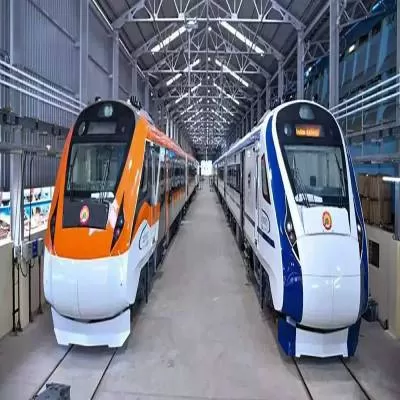

The Vande Bharat Sleeper, as announced by Railways Minister Ashwini Vaishnaw in October 2023, was anticipated to be launched by March 2024. Vaishnaw mentioned that this version would offer superior amenities compared to the Rajdhani/Shatabdi trains. It was suggested that introducing a Sleeper version would attract more overnight traffic on some of the Indian Railways' busiest routes.
However, there has been a slight delay in the timeline, and it is now anticipated that the first prototype of the Vande Bharat Sleeper will be ready by mid-2024, with the actual launch expected a few months thereafter. Recently, Vaishnaw inaugurated the car body structure of the Vande Bharat Sleeper, which is being manufactured by Bharat Earth Movers (BEML). Like its chair car predecessor, the sleeper Vande Bharat aims to enhance passenger comfort and reduce travel time through design improvements and other upgrades. However, like the chair car version, the launch of the Sleeper variant is also facing delays.
Prime Minister Modi announced the launch of 75 Vande Bharat trains in 75 weeks during his Independence Day speech in 2021. However, only 56 chair car trains have been rolled out from the Integral Coach Factory, Chennai, which was tasked with manufacturing the chair car version of the Vande Bharat series.
The Vande Bharat trains, known for their engine-less design running on traction, promise faster braking, acceleration, and deceleration compared to older trains. These trains offer lower cabin noise, improved safety features, and faster journeys, among other passenger amenities. While the first Vande Bharat Express was introduced in February 2019, offering only chair car seating, the Sleeper version is currently in development, followed by a standard gauge VB intended for export markets. The Vande Bharat Express can reach speeds of up to 160 kilometres per hour and provides various travel classes with enhanced facilities.
The Ministry of Railways was approached with queries regarding the VB Sleeper bids and the reasons for the delay in its rollout, but responses were not received. However, it is known that tenders were initially called for 200 Vande Bharat Sleeper trains, won by two consortia: RVNL-TMH-LES and BHEL-Titagarh Wagons. Subsequently, BEML was awarded a contract for ten trains to meet the anticipated timeline for the General Elections of 2024.
The first consortium, comprising Rail Vikas Nigam Limited, Transmashholding, Locomotive Electronic Systems, and LES, is responsible for manufacturing 120 Vande Bharat Sleeper trains, while the second consortium will manufacture the remaining 80 trains. Disputes over the first consortium's majority shareholding delayed progress, ultimately resulting in the Russian partner holding a 70% stake in the new SPV, Kinet Railway Solutions Limited.
Despite its delayed timeline, BEML is expected to deliver a Sleeper Vande Bharat within 2024. However, concerns have been raised regarding BEML's expertise in manufacturing such trains, with some suggesting that ICF Chennai, responsible for the chair car version, would have been a more suitable choice.
The Vande Bharat project has been praised for introducing semi-high-speed trains, but experts caution against claims of significant speed improvements, citing the need for track upgrades. Currently, most tracks are only suitable for speeds up to 130 kilometres per hour. Although the Sleeper can operate at 160 kilometres per hour, track upgrades are necessary to fully realise this potential.
The pricing of the Vande Bharat Sleeper will be crucial, with comparisons drawn to existing fare structures. Occupancy rates on Vande Bharat trains, particularly on routes like Bengaluru-Hyderabad, indicate a need for competitive pricing to ensure viability against existing services like the Rajdhani.